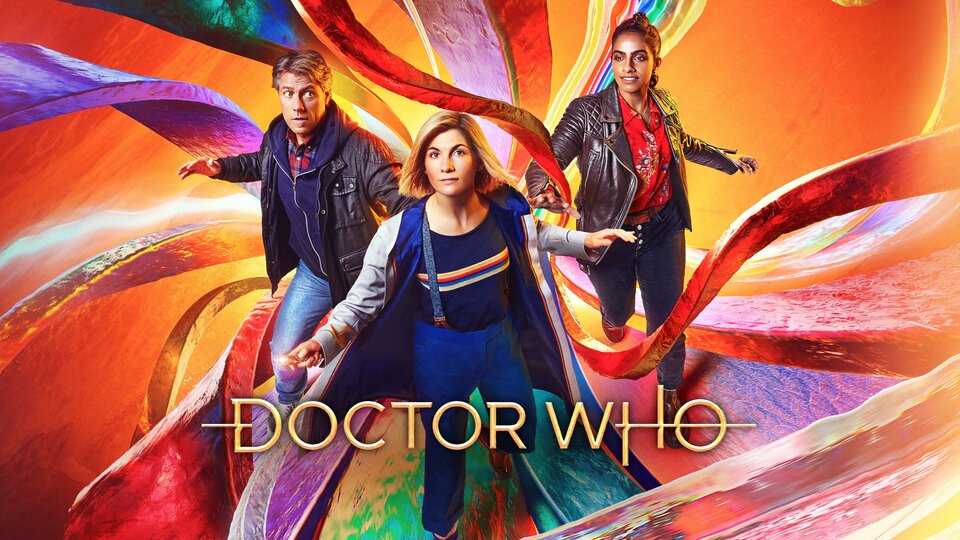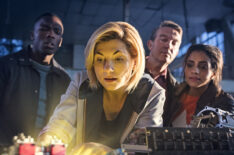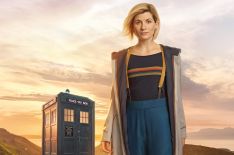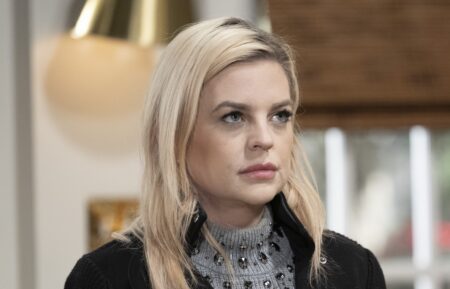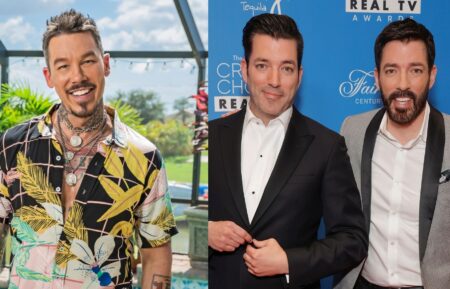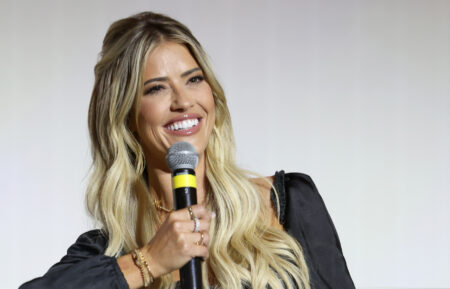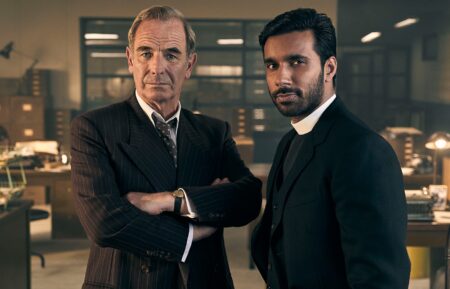It’s All Change in the ‘Doctor Who’ Season 11 Premiere (RECAP)
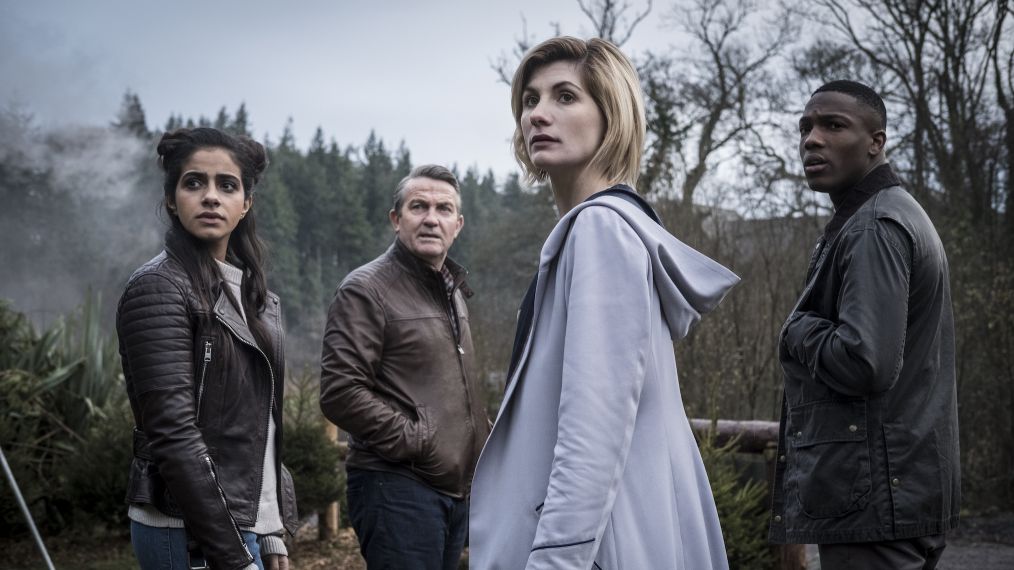
Spoiler Alert
Doctor Who is back and it’s all change! A new Doctor. A set of companions. A new writing team and showrunner. A new composer. Even a new time slot. Not since Russell T Davies relaunched the iconic sci-fi series in 2004 has Doctor Who gone through such a significant regeneration.
And tonight’s Season 11 premiere kicked off this new era with a charming, if somewhat conventional episode, that if nothing else proved that the TARDIS is in safe hands with Jodie Whittaker (well, if she can find the damn thing).
Introducing a new Doctor is a daunting task at the best of times but this series isn’t just about an accent change and a fresh costume, for the first time in the show’s near 55-year history, the Doctor has also changed gender. If you thought multi-colored Daleks was a contentious topic, then you can imagine the fiery reaction in certain corners of the “Whoniverse” when it was announced that the new Doctor was to be a woman. It’s the biggest change the show has ever seen, and the debate surrounding it has been unavoidable.
The pre-season promos haven’t shied away from the subject either, what with Whittaker literally “breaking the glass ceiling” and double-entendre taglines declaring “It’s about time!” And yet, outside of one or two humorous references, “The Woman Who Fell To Earth” cleverly sidesteps the issue and allows Whittaker to just be the Doctor.
Personally, the gender change never worried me; I think it’s the kind of shake-up the show needed, and ever since seeing her in Attack The Block, I knew Whittaker had the acting chops to make for a fantastic Doctor. She delivers a naturally charming performance in her debut episode, falling somewhere between the frenetic zaniness of David Tennant and Matt Smith but with enough Yorkshire grit to make the character her own.
“There’s echoes of who I was and a sort of call towards who I am, and I just have to hold my nerve and trust all these new instincts,” she says at one point, reassuring both herself and the audience that though this latest evolution is new and different, it’s going to be a fun ride.
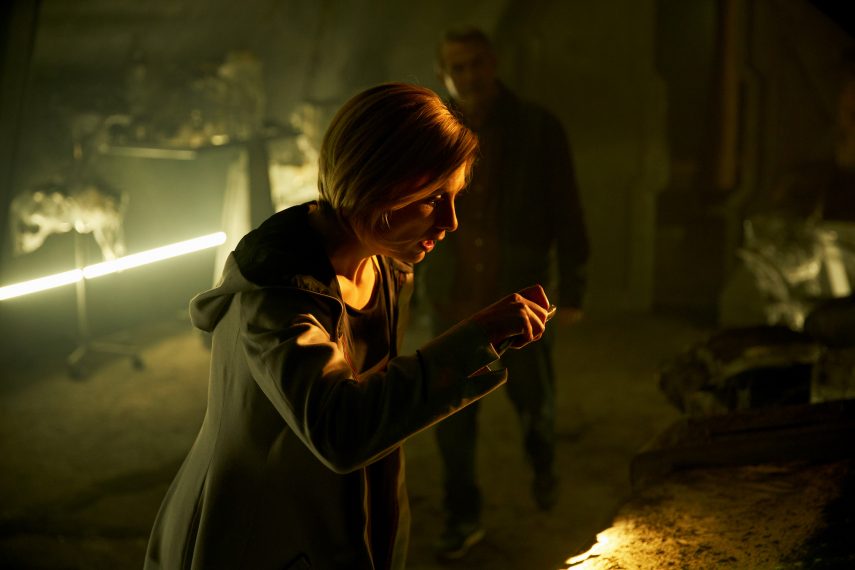
The Doctor (JODIE WHITTAKER), Graham O’Brien (BRADLEY WALSH, BBC)
Heading into the new season, I was far more concerned with Chris Chibnall taking over as showrunner than I was about a female Doctor. Chibbers is a longstanding member of the Who writing staff but his episodes (“The Hungry Earth,” “Dinosaurs On A Spaceship,” etc.) have never set the world alight and his contribution to the series until now has been average at best.
That’s not to say he’s a lousy writer — Broadchurch, which also starred Whittaker, is a brilliantly believable human drama, the first season of which stands-up as a modern classic. He’s just not the most exciting Who writer. Let’s put it this way, if Steven Moffat’s Doctor Who was the New York Times cryptic crossword, then Chibnall’s is the puzzle you find on the back of a cereal box. His style of Who tends to be safe and straightforward, but perhaps that is what the BBC is looking for after Moffat’s series became increasingly abstruse and self-referential.
Look, I don’t think I’m breaking any news when I say Who has dropped in viewership in recent years. There was certainly less buzz during the Peter Capaldi-era compared to the Tennant and Smith years, though recent scheduling conflicts are as much to blame as Moffat’s direction of the show. Maybe Chibnall can reel back on the convoluted plots and fanboyisms and deliver a more digestible and relatable Who for a mainstream audience. After all, if there is one thing Chibbers is good at it’s emphasizing the relationships at the core of a story — perhaps demonstrated best in his Season 7 episode “The Power of Three,” arguably his strongest episode of Who despite the plot’s lackluster conclusion.
I just worry about the show’s storytelling losing its sense of unpredictability and flair. But if Chibbers can anchor the show’s emotional center while allowing his writing team (Malorie Blackman, Ed Hime, Vinay Patel, Pete McTighe and Joy Wilkinson) to deliver provocative and thrilling stories, maybe everything will balance itself out?
Tonight’s premiere is the kind of Chibnall episode fans have come to expect over the years. A relatively uncomplicated story with a fairly uninspiring villain and some creaky dialogue in places, but held together by its strong character focus. It was a very down-to-earth story, literally, as the entire episode took place in the city of Sheffield. There was no time-hopping or multiple realities or mass alien invasions.
Also, the look and feel, combined with Segun Akinola’s soundtrack, gave the show a darker more sombre atmosphere which worked well at setting it apart from series gone-by. It was a simple yet efficient episode about the Doctor finding her new friends and helping them put a stop to the big-bad of the week.
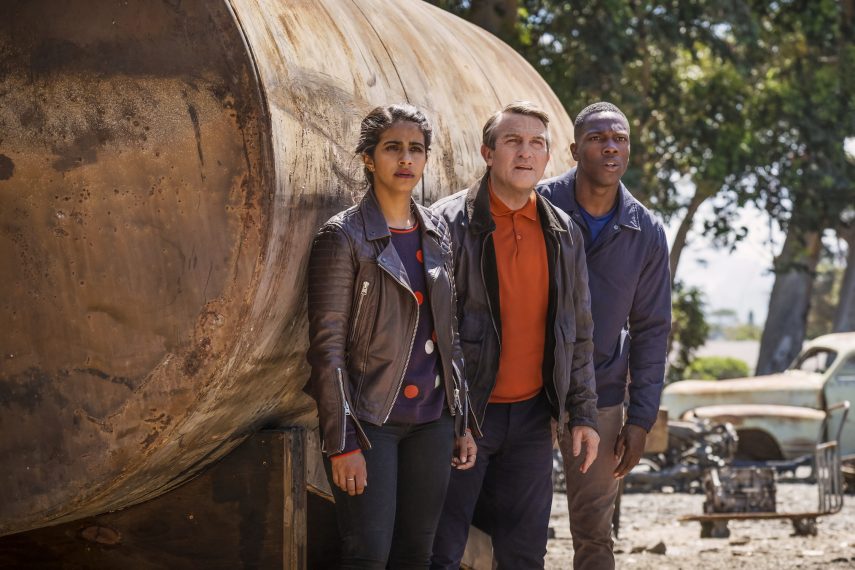
Picture Shows: Yasmin Khan (MANDIP GILL), Graham O’Brien (BRADLEY WALSH), Ryan Sinclair (TOSIN COLE)
Despite some heavy-handed dialogue, I was impressed at how quickly the episode introduced the new characters and how immediately the cast clicked. Ryan (Tosin Cole) is our entry point into the story and the most developed of the new companions. An affable warehouse worker, Ryan suffers from dyspraxia — a neurological disorder which causes problems with coordination and movement — and has a strained relationship with his step-granddad Graham (
Graham, the resident skeptic of the group, is mostly used as comedic relief, but his speech at nana Grace’s (Sharon D Clarke) funeral at the end of the episode displays a deeper emotional depth. Yasmin (Mandip Gill), the overlooked rookie police officer, is the most underutilized so far and feels the least connected to the group, though we do find out she went to school with Ryan. But Yaz shows signs of a strong-willed character who should complement the other personalities in the gang (or did we decide on fam?) nicely throughout the series.
The Doctor falls from the night sky directly into the lives of these people and wastes no time in taking control, even if she can’t quite remember who she is, or the word for “tongue” for that matter. There is a problem and the Doctor is there to fix it because that’s what she does. As I mentioned previously, Whittaker hasn’t quite stamped her own personality on the Doctor just yet, which no one expects in the first episode, but she is most definitely the Doctor from her very first scene.
She is smart and inquisitive and a beacon of positivity among the darkness. Without her TARDIS or sonic screwdriver, she has to rely on her wits and cunning, all the while suffering from the wobbly effects of post-regeneration. If you weren’t on board by the time the Doctor crafted a sonic screwdriver out of spoons and circuit boards, then I’m not sure what to say.
As for the alien plot, it’s essentially Predator set in a Northern working-class city in England. A Venom-looking monster emerges from a pod which resembles an upside-down spinning top and stalks around town looking for a “human trophy” to bring back to his home planet. It’s certainly not the scariest alien in the pantheon of Doctor Who villains, but it serves its function for an introductory episode, and the face made of teeth is a wonderfully gruesome image.
Also, the “Tim Shaw” gag is the funniest moment of the premiere, even if the joke was over-egged towards the end. In a gorgeously shot final sequence, the Doctor and her new team defeat the Stenza Warrior atop a crane, but not without a tragic casualty.
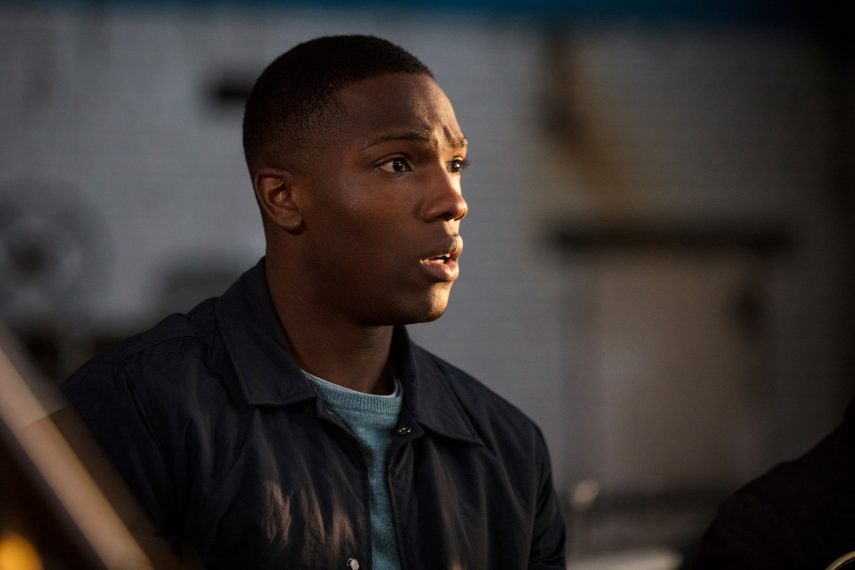
Picture shows: Ryan Sinclair (TOSIN COLE)
Losing nana Grace, who sacrifices herself to save the day, was to be expected, given that Sharon D Clarke wasn’t announced as a regular cast member. However, her death serves a larger purpose of connecting these characters together, particularly Ryan and Graham, who now both have to deal with this heartbreaking loss while unwittingly traveling the universe with the Doctor, a woman they hardly know, and who hardly knows herself, despite remembering her name and fitting herself with a new outfit by the episode’s end.
That’s what makes this cliffhanger so intriguing, none of the new companions chose to go with the Doctor, which is usually the case. Instead, they were accidentally transported into outer space by the Doctor’s makeshift TARDIS locator device. That potentially creates a refreshing dynamic from the typical starry-eyed humans blindly following the Doctor into danger.
This was a solid opener that introduced a group of likable characters and a charismatic Doctor on a journey of evolution. I don’t know about you, but I’m ready to hold my nerve and trust these new instincts. It’ll be fine. In the end. Hopefully.
Additional Notes
– At the end of the episode, Graham reveals that he is in remission after going through chemo treatment for cancer. Grace was his nurse and the two fell in love. It’s a heavy subject (and one particularly close to my heart at the minute), but it gives the story and the character some real emotional weight – the same with Ryan and his dyspraxia. None of this is used to paint the characters as victims, in fact, they refuse to let their conditions hold them back. It’s just another sign of Doctor Who’s inclusivity.
– Chibnall has been pretty adamant that this series will not have an overarching storyline in the style of say Bad Wolf or The Silence. But I do wonder if the search for the TARDIS is going to be the central hook loosely connecting the episodes together.
– As a Yorkshiremen, I was well-chuffed hearing all those Northern accents in a globally mainstream TV show, even if it is going to cause a problem for American subtitle writers.
Doctor Who, Sundays, 8/7c, BBC America

